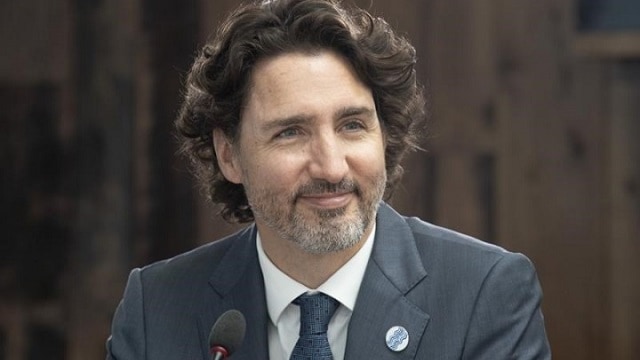Canada donating 13 million surplus COVID-19 vaccine doses to poor countries
Published June 13, 2021 at 4:21 pm

Prime Minister Justin Trudeau pledged 13 million surplus vaccines to help the world get immunized against COVID-19 as he and other G7 leaders wrapped up a two-day summit in Britain dominated by the pandemic, climate change and China.
Canada previously said it would offer up to 100 million vaccine doses to help poorer countries fight the spread of COVID-19, but was the only country from the G7 to not say how many of those would be actual shots rather than money.
Trudeau on Sunday said in addition to the 13 million surplus shots, Canada will pay for the purchase and distribution of 87 million doses through the ACT-Accelerator, a global program to make sure the entire world has access to COVID-19 testing, treatments and vaccines.
The prime minister told reporters during a closing news conference that some of the promised jabs are already on their way to countries lagging wealthy nations in the worldwide immunization effort. But he stopped short of saying when the rest would arrive.
“A number of these doses are on their way as we speak, more will come in the coming months,” Trudeau said. “We’re going to be able to share around the world as we see Canadians getting vaccinated to higher and higher levels, and we simply do not need those doses.”
The Prime Minister’s Office later provided a breakdown showing more than 7 million of the doses being donated are from pharmaceutical firm Novovax, whose vaccine has yet to be approved for use in Canada.
The remainder are Oxford-AstraZeneca doses and shots from Johnson and Johnson that Canada bought through COVAX, an international vaccine sharing initiative.
Canada has been criticized for being the only G7 country to take and use shots from COVAX.
U.S. President Joe Biden has committed 80 million doses from his country’s own supply, while the United Kingdom has pledged 100 million by the end of the year. Japan, Germany, Italy and France have also pledged to share millions with COVAX.
Trudeau emphasized that the donation would not affect Canada’s own vaccination efforts, which have ramped up in recent months with the delivery of shots from Pfizer-BioNTech and, to a lesser degree, Moderna.
“This global commitment on vaccines is in addition to and in parallel with our vaccine rollout at home,” Trudeau said. “We have millions of doses being delivered into the country each week, and every day more and more people get their first and second shots.”
Surplus COVID-19 shots weren’t the only assistance that Trudeau pledged to poorer countries, as he also announced more than $2 billion in new Canadian aid over five years for nations struggling with the effects of climate change.
Yet while COVID-19 and climate change figured prominently in the G7 leaders’ discussions and Canada’s post-summit pledges, the thorny issue of how to handle increasing competition and aggression from China was also top of mind throughout the weekend.
G7 leaders presented an infrastructure plan called “Build Back Better for the World,” calling for spending hundreds of billions of dollars alongside the private sector while adhering to climate standards and labour practices.
It is designed to compete with China’s “Belt and Road Initiative,” which launched a network of projects in large parts of the world, primarily Asia and Africa. Critics say China’s projects often create massive debt and expose nations to undue influence by Beijing.
Trudeau did not explicitly mention the new initiative or China’s treatment of ethnic minorities such as Uyghur Muslims, topics touched on during the summit, but did thank fellow G7 leaders for supporting Canada’s calls for the immediate release of Michael Kovrig and Michael Spavor.
“What has happened to the two Michaels should not have happened, and indeed could happen in any country in the world,” he said. “The use of arbitrary detention and coercive diplomacy by China is a concern to us all.”
Beijing detained the two Canadians days after the arrest of Huawei executive Meng Wanzhou at the Vancouver airport on an extradition request from the United States.
Yet when asked if he would describe China as an adversary, the prime minister emphasized the need to both work with the country on global challenges like climate change while recognizing it as a competitor on trade and a source of concern when it comes to human rights.
Stephanie Taylor, The Canadian Press
insauga's Editorial Standards and Policies advertising





